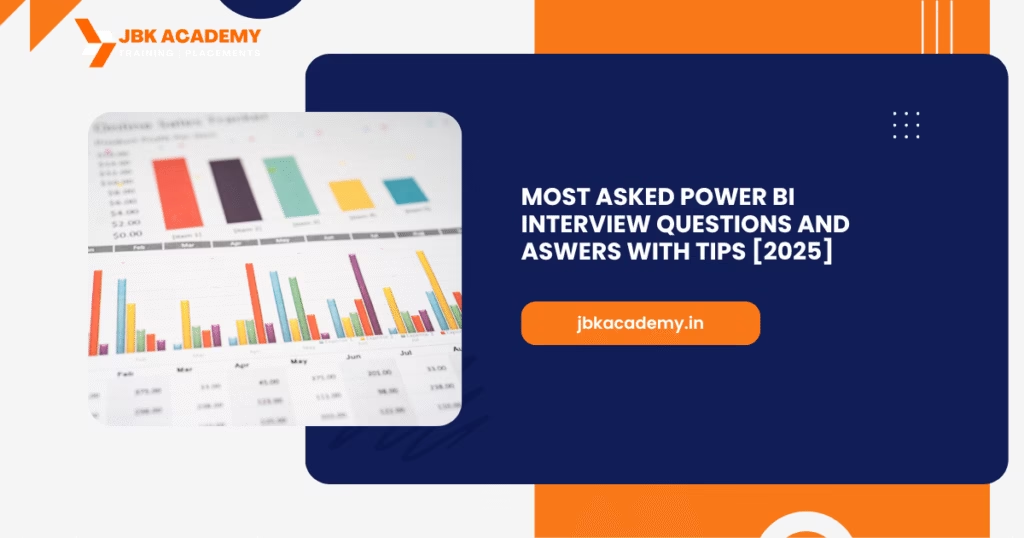Top Excel Skills for Advanced Excel: You Should learn to get a high-paying Job in 2026
The Top Excel Skills for Advanced Excel You Should learn to get a high-paying Job in 2026 Excel has been a dependable tool in the

Are you preparing for a Power BI interview in 2025? Whether you’re a fresher, experienced analyst, or BI developer — mastering these questions will boost your confidence and help you impress recruiters with practical knowledge and real-world examples.
In this blog, you’ll find 50 carefully selected Power BI interview questions, clear answers, practical tips, and bonus insights to help you ace your next interview!
Answer:
Microsoft Power BI is a leading business intelligence tool that helps you connect, transform, analyze, and visualize data to make informed decisions.
Tip: Keep it simple — mention your real use case if possible.
Power BI Desktop (for creating reports)
Power BI Service (cloud-based sharing & collaboration)
Power BI Mobile (mobile app)
Power BI Gateway (connect on-premises data)
Power BI Report Server (on-premises publishing)
Power Query (data transformation)
Power Pivot (data modeling)
Desktop: Build and design reports.
Service: Publish, share, collaborate, and schedule refresh.
DAX (Data Analysis Expressions) is a formula language for custom calculations in Power BI.
Examples: SUMX, CALCULATE, FILTER, ALL.
Visual-level Filters
Page-level Filters
Report-level Filters
A tool for connecting and transforming raw data before loading it into Power BI.
A bridge to connect on-premises data with Power BI cloud services securely.
A single visualization pinned to a dashboard.
Measures: Calculated dynamically.
Calculated Columns: Calculated during data load, stored in the model.
It restricts data access based on user roles.
A fact table connected to multiple dimension tables for better performance.
Import: Data stored in Power BI.
DirectQuery: Queries run directly on the source.
Combines Import and DirectQuery in one model.
Navigates from a summary page to detailed insights on a specific data point.
Lets users explore lower hierarchy levels within visuals.
Bookmarks save the current view, filter, and state for storytelling.
Users type natural language queries — Power BI generates visuals automatically.
An on-premises server for publishing Power BI reports within your organization’s firewall.
Embed Power BI visuals into your custom web apps.
Visuals created by developers or third parties and imported from AppSource.
Reusable ETL pipelines for transforming and managing data in the cloud.
Refreshes only new or updated data instead of reloading entire datasets.
Tracks progress toward a target value.
Displays a single metric or number.
Shows how incremental changes affect a starting value.
Plots data points to show relationships between variables.
Breaks down data step-by-step to analyze factors driving a metric.
A visual filter to allow users to slice data interactively.
Table: Flat view of rows/columns.
Matrix: Pivot-style with rows, columns, and values.
Predefined or custom color schemes for consistent branding.
Links between tables using keys.
One-to-one, one-to-many, or many-to-many.
Filters flow in both directions between tables.
Interaction between visuals to filter related data.
Sync slicers across multiple pages in a report.
Dashboard: Single-page, high-level summary.
Report: Multi-page, detailed visuals.
Set data type (e.g., Address, Web URL, Image URL).
Prebuilt calculations without writing DAX manually.
Tool to analyze report performance and optimize visuals.
Pushes transformations back to the source for efficiency.
Pre-aggregated data tables to improve performance.
Dynamic input used in queries for flexible data loading.
Used in Power Query for data transformation steps.
Isolated workspace for development/testing before publishing.
Package multiple dashboards and reports for easy sharing.
Define user access and permissions.
Design in Desktop
Publish to Service
Share via Apps/Dashboards
Schedule Refresh
Tracks report views, interactions, and user activity.
Use star schema.
Remove unnecessary columns.
Optimize DAX.
Use aggregation tables.
Limit visuals.
Use Incremental Refresh.
✅ Highlight hands-on experience: real dashboards, gateways, RLS.
✅ Brush up on core DAX functions.
✅ Know when to use Import vs DirectQuery.
✅ Be ready for scenario-based questions.
✅ Practice explaining your past projects clearly.
Use this guide as your go-to checklist. Practice these questions, understand the concepts deeply, and you’ll be fully prepared for your next big opportunity!
✅ Experienced Trainers — Learn from industry experts with real-world experience.
✅ Practical Training — Focus on hands-on learning and live projects.
✅ Industry-Relevant Courses — Updated curriculum aligned with current market needs.
✅ Affordable Fees — Quality education at reasonable costs.
✅ Flexible Timings — Weekend and weekday batches to suit students & working professionals.
✅ Placement Assistance — Dedicated support for job placements and internships.
✅ Certifications — Get recognized certifications to boost your career.
✅ Personalized Guidance — One-on-one doubt clearing and mentoring.
✅ Modern Infrastructure — Well-equipped labs and updated software.
✅ Positive Student Reviews — Trusted by thousands of successful learners.
The Top Excel Skills for Advanced Excel You Should learn to get a high-paying Job in 2026 Excel has been a dependable tool in the
Are you preparing for a Power BI interview in 2025? Whether you’re a fresher, experienced analyst, or BI developer — mastering these questions will boost
Basic & Intermediate What is Excel and what are its main uses?A spreadsheet program used for data entry, analysis, visualization, and reporting. What is a
Basic Zoho Books Interview Questions and Answers What is Zoho Books?Zoho Books is cloud-based accounting software designed for small to medium-sized businesses. It helps manage
In today’s competitive accounting job market, having knowledge of Wings Accounting Software can give you an edge — especially if you’re applying for positions in
QuickBooks is one of the most trusted accounting software solutions for small and mid-sized businesses. Whether you’re applying for a bookkeeping, accounting, admin, or finance